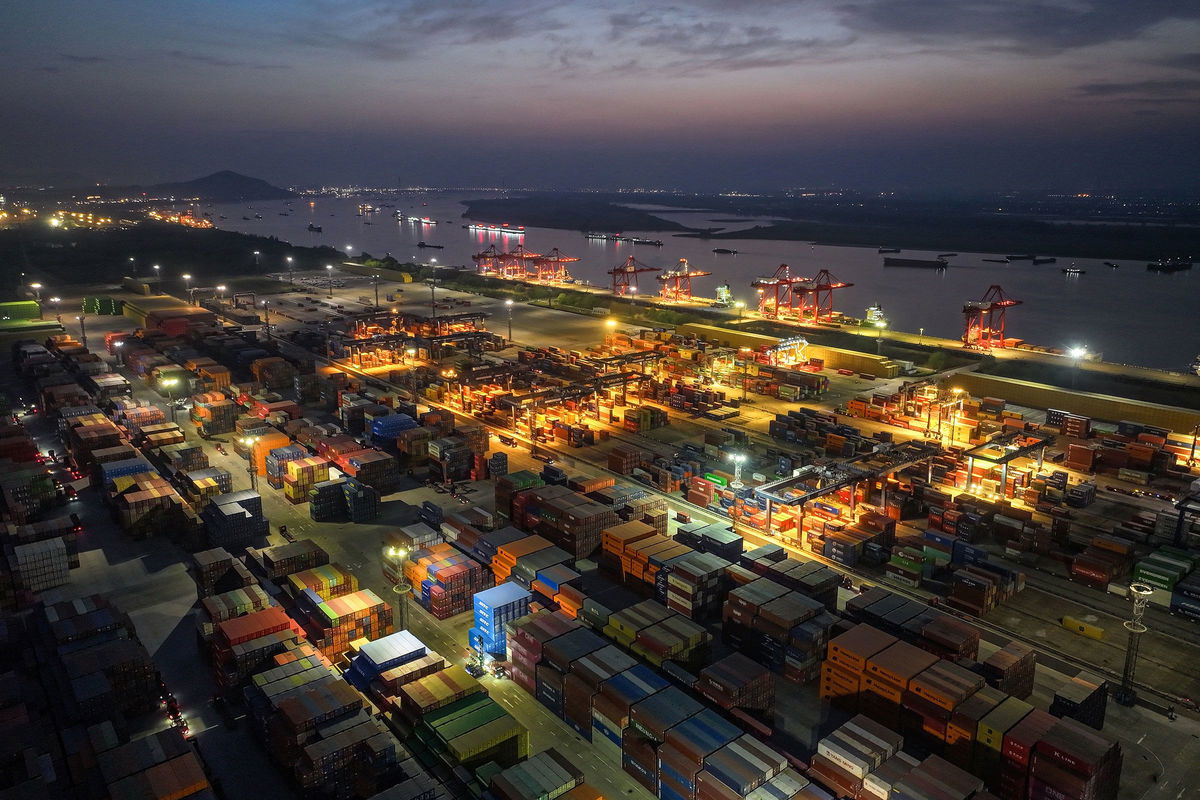China vows ‘resolute and effective measures’ after Trump’s 104% tariffs take effect

Shipping containers are seen at a port in Nanjing
By Nectar Gan, CNN
Hong Kong (CNN) — China has promised to take “resolute and effective measures” to safeguard its rights and interests, hours after US President Donald Trump’s 104% tariffs on Chinese imports took effect on Wednesday.
“The United States is still imposing arbitrary tariffs on China and relentlessly applying extreme pressure. China firmly opposes this and will never accept such domineering and bullying behavior,” Chinese Foreign Ministry spokesperson Lin Jian told a regular news conference.
China and the US have been involved in a game of tit-for-tat on trade, with Beijing standing firmly against each new tariff introduced by Washington.
After the latest round kicked in on Wednesday, Lin told media that US needed to “demonstrate an attitude of equality, respect and mutual benefit” if it truly wanted to resolve the trade war through dialogue.
“If the US disregards the interests of both countries and the international community and insists on waging a tariff war and trade war, China will fight to the end,” Lin added.
US levies on Chinese imports had been set to increase by 34% on Wednesday as part of Trump’s “reciprocal” tariffs package. But the president tacked on another 50% after Beijing didn’t back down on its promise to impose 34% retaliatory tariffs on US goods by noon Tuesday. Prior to the latest round of escalation, Trump had already imposed 20% levies on China since his return to the White House.
Beijing has not announced immediate retaliatory measures against Trump’s latest round of levies. But so far, the message from the Chinese government, state media and opinion leaders alike has been one of defiance, voicing their determination to strike back while leaving the door open for negotiation.
Shortly after the latest tariffs kicked in, China released a white paper on its trade and economic ties with the US – relations it said had been damaged by the “unilateral and protectionist measures” taken by Washington.
‘Resolute countermeasures’
In a written Q&A about the white paper, an unnamed Chinese Commerce Ministry official emphasized that China does not want a trade war, but said Beijing would “never sit idly by” while the legitimate rights and interests of the Chinese people are harmed or stripped away.
“If the US insists on further escalating trade restrictions, China has the firm will and ample tools to take resolute countermeasures — and will see it through to the end,” said the official.
They also said it was “normal” for the two major powers to encounter friction in their economic and trade policies, and that China was willing to engage with the US through “equal consultation” to address each other’s concerns.
The official accused the US of using tariffs to “overturn the existing international economic and trade order” and attempting to “artificially disrupt established global supply and industrial chains.”
While Beijing has telegraphed a clear message of carefully calibrated confidence, some Chinese businesspeople are less optimistic.
While Beijing has telegraphed a clear message of carefully calibrated confidence, some Chinese businesspeople are less optimistic. Ms Ye, a toy seller based in the southern city of Shantou, said she was concerned that Trump’s levies could cost her job.
“The only way to relieve my worries is to smile with bitterness. I don’t even know if I will be laid off,” she told CNN.
Ye said her company was planning to suspend shipments to the US and still deliberating whether to give up on the US market entirely.
Strengthening ties with neighbors
Chinese leader Xi Jinping has not directly addressed Trump’s latest tariffs, but on Wednesday he called for China to build a “shared future with neighboring countries,” while speaking at a high-profile Communist Party work conference on peripheral diplomacy.
An official statement from the two-day meeting, which ended Wednesday, pledged to consolidate strategic mutual trust with China’s neighbors and properly manage differences and disputes. It also called for deepening development integration and “strengthening cooperation on industrial and supply chains.”
While it was likely pre-arranged, the conference comes as China seeks to turn the trade crisis into opportunity by capitalizing on the disruption to the global order. That includes America’s relations with allies and partners.
The last time China had held a similar meeting focusing on relations with neighboring countries was in 2013. Wednesday’s statement said China’s relations with its neighbors were “at their best since modern times, while also entering a critical phase in which regional dynamics and global changes are becoming deeply interconnected.”
Last month, Beijing held economic talks with Japan and South Korea, two US allies that were hit with 24% and 25% tariffs by the US respectively. Both countries are now seeking deals with Washington to lower those tariffs.
Countries in Southeast Asia, key manufacturing hubs for companies looking to diversify away from China, have been hit particularly hard by Trump’s tariff war. Some have also asked Trump to delay the tariffs.
“These countries are calling us up. Kissing my a**. They are dying to make a deal,” Trump told a group of Republicans on Tuesday evening, hours before the tariffs were set to take hold. He described foreign leaders essentially groveling to avoid the new tariffs: “Please, please sir, make a deal. I’ll do anything sir.”
This story has been updated with additional information.
The-CNN-Wire
™ & © 2025 Cable News Network, Inc., a Warner Bros. Discovery Company. All rights reserved.



